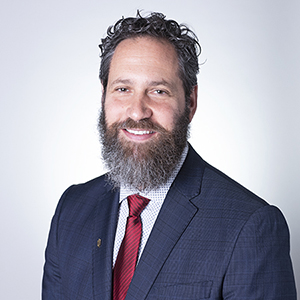A hot-button issue amongst today’s youth is sexual consent, a topic that William L. Yarber Endowed Professor in Sexual Health Kristen Jozkowski, Ph.D. has spent the last several years studying and shaping with her professional expertise.
The IUSPHB community is pleased to share that Dr. Jozkowski was recently named a Fellow in The Society for the Scientific Study of Sexuality (SSSS), joining esteemed colleagues William Yarber, H.S.D., Debby Herbenick, Ph.D., and Department Chair Eric Walsh-Buhi, Ph.D. who share this distinction.

"Dr. Jozkowski has more than 15 years in the field of public health and sex research, with a focus on sexual consent, sexual assault prevention, and abortion attitudes, among other areas," Dr. Walsh-Buhi stated in his letter of nomination. "She has been a member of SSSS since 2007, where she has held a variety of important leadership roles, including serving on the Board of Directors and as secretary for the organization as well as the Annual Conference planning co-chair."
Dr. Jozkowski also spent seven years in a leadership role in the Sexual and Reproductive Health section of the American Public Health Association, and last fall was the only non-member of the Centers for Disease Control and Prevention (CDC) to co-author "Asking for Verbal Consent and Experiences of Sexual Violence and Sexual Behaviors Among High School Students – Youth Risk Behavior Survey, United States, 2023" for the organization’s Morbidity and Mortality Weekly Report.
"It was so generous and kind of Dr. Walsh-Buhi to take time out of his busy schedule and put forward a nomination for me, and I am really pleased to be acknowledged by the field of sex science as it has been an academic and professional home for me for so long," says Dr. Jozkowski, who credits Penn State professor Patricia Koch, Ph.D. with inspiring her to pursue a career in sexual health research.
"To be recognized for my scholarship feels great," she adds.
Dr. Jozkowski cites two major events over the last decade as being partially responsible for the growing interest in the topic of consent: The adoption of affirmative consent standards in institutions of higher education, particularly in the states like California and New York where the state legislature passed legislation to require adoption of these policies 2014 and 2015 respectively, and the #MeToo movement that gained traction in 2017.
"More than 2,000 universities, including IU, have adopted an affirmative consent standard, which the university defines as an active, explicit form of consent for sexual activity that needs to be present for sex to be consensual and not assaultive," says Dr. Jozkowski. "The CDC’s Youth Risk Behavior Surveillance (YRBS) survey hadn’t asked any questions on this topic, ever, so in 2022 they added a measure of consent."
Because CDC based some of their design of the consent survey item on Dr. Jozkowski’s research, they asked her to help write about the findings, which were largely positive—79.8 percent of high school students surveyed reported asking for sexual consent verbally at last sexual contact. The survey sampled largely heterosexual partnerships, and only 74.5 percent of females reported asking for sexual consent verbally compared to males at 84.6 percent.

"The survey only asked about verbal; it didn’t ask what other ways the students may show consent through nonverbal or implicit queues. Had they included those additional items we may have seen more variability there," says Dr. Jozkowski. "Also, young people are more keyed into consent than an older cohort because they have been exposed to more messaging around consent in recent years."
Dr. Jozkowski wasn't surprised at the lower percentage of females asking for verbal consent, as research shows that women are more inclined to respond to their partner's initiative—and people might be more inclined to respond with nonverbal than verbal cues. "It is encouraging that most of the sample had communicated consent in some way."
In addition to her recent CDC paper, Dr. Jozkowski also co-authored "Recent research involving consent, alcohol intoxication, and memory: Implications for expert testimony in sexual assault cases" for the International Journal of Law.
"In the CDC report, they did ask about substance use before sex but the prevalence of that amongst high school students was quite low," says Dr. Jozkowski. "To the extent that alcohol influences consent is an area I have been studying for the last eight years because alcohol-involved assault is so common, yet so is alcohol-related consensual sex, so it is a gray area."
While it can be uncomfortable to think about students younger than college age having sex, Dr. Jozkowski says it is encouraging that most of the sample in the CDC survey communicated consent in some way. It means that young people can ideally establish those boundaries and confidence before substance use becomes more common for people in their late teens and early twenties.
"I am working on a paper right now where we asked young adults how they know if they have consented or their partner has consented after alcohol consumption, and we discovered the process is really complicated and difficult to navigate," says Jozkowski. "Many said it was reflecting back when sober that they determined it was a consensual yes—but of course by then it is too late and it's already happened, which is not necessarily the best practice but that’s how college students are talking about navigating it right now. There is so much need to bridge these two areas to include consent in drinking."
For more inspiring stories about SPH-B students, faculty, and staff, visit go.iu.edu/48bx.


